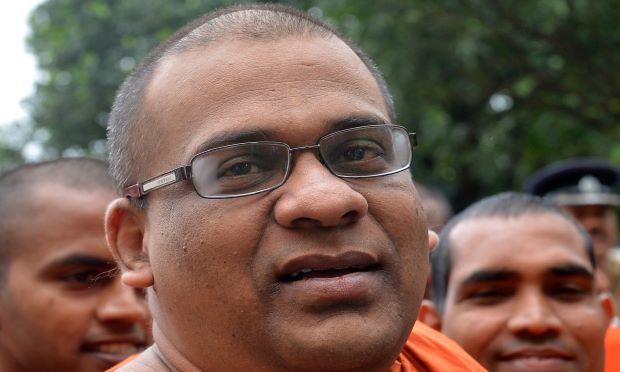President extends tenure of controversial ‘One Country, One Law’ task force

COLOMBO – President Gotabaya Rajapaksa has extended the tenure of the ‘One Country, One Law’ task force headed by a controversial Buddhist monk by three more months, even as the country faces close scrutiny of its human rights record at the United Nations Human Rights Commission (UNHRC) in Geneva.
A gazette notification announcing the extension was issued Monday (Feb 28), the same day the 49th UNHRC session officially began.
According to the presidential directive, the time given to accomplish the functions and responsibilities assigned to the task force, which was to end on Monday, was not enough to “seek the views of the public and the panels of experts covering all provinces of the island”.
President Rajapaksa announced the establishment of the task force in a gazette notification in late October 2021, tasking it to come up with proposals for “one law” for all Sri Lankans, abolishing all other personal laws including Muslim personal laws, specifically marriage laws, and some other regional laws that go back centuries. The Muslim Marriage and Divorce Act (MMDA) in particular has been the focus of much debate, with many women’s rights activists within the Muslim community calling for reform and an end to child marriage.
The task force is headed by the General Secretary of the Bodu Bala Sena (BBS), Galagoda Aththe Gnansara Thera, whose appointment was widely panned by opposition lawmakers, civil society groups and others including those within the government’s own ranks.
The firebrand monk has been accused of promoting Islamophobia in Sri Lanka.
In 2012, Gnanasara Thera was allegedly at the forefront of an anti-Muslim campaign which called on the majority Sinhalese to boycott Muslim-owned businesses.
The United States in 2014 cancelled a visa issued to the mon, while social media platform Facebook blocked his account after the BBS’s alleged involvement in violence against Sri Lanka’s minority Muslims in the Western coastal town of Aluthgama.
He was arrested for contempt of court in 2018, during the previous administration, but was later pardoned by President Maithripala Sirisnena.
Critics have said Gnanasara Thera has been used to create a rift between the Sinhala majority and Muslim minority for political reasons. But the monk has denied the allegation and has said Sri Lanka’s Sinhala majority has issues that have been ignored by politicians, issues that he had tried to address.
Since the 2019 Easter bombings, the monk has maintained that his cause is not against ordinary Muslims who have coexisted with the Sinhalese for centuries but with extremist, Wahabist elements in Muslim society.
Speaking to reporters shortly after his appointment, the Thera said recommendations by the BBS, widely seen as an ultranationalist outfit, will make it to the proposals of the presidential task force he leads.
The monk said the BBS had spoken about unethical conversions, destruction of archaeological monuments and cultural invasion.
The One Country, One Law task force was also criticized for not having any Tamil representation or women initially, prompting President Rajapaksa to appoint three new members, purportedly representing women and the minority Tamil community. Justice Minister Ali Sabry was also reported to have expressed his surprise at the task force and the appointment of Gnanasara Thera as its chair without his consultation. Reports emerged later that he had tendered his resignation over the matter, but the President had refused to accept it. Sabry continues to serve as Justice Minister.
Opposition MP and leader of the Janatha Vimukthi Peramuna (JVP), Anura Kumara Dissanayake, has said the task force may be a step towards further division between communities rather than a means to bring them closer.
“This is serious. Some communities have expressed opposition to this committee and have shared their concerns. We must govern not in a direction that sees conflict intensify but in a direction that sees conflict resolved, not in a direction that sees communities grow apart but come closer,” Dissanayake told Parliament in November.
-economynext.com/ENCL

